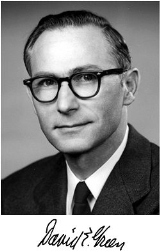
David E. Green
Encyclopedia
David Ezra Green was an America biochemist who made significant contributions to the study of enzyme
s, particularly the electron transport chain
and oxidative phosphorylation
. He was born in New York
and was awarded a degree in biology from New York University
. He then moved to England and worked for eight years at the University of Cambridge
under the supervision of Malcolm Dixon
, on redox
reactions in biological systems. He received his thesis under Green in 1934 with a thesis entitled The Application of Oxidation-Reduction Potentials to Biological Systems.
At the outbreak of the Second World War, Green moved back to America and established himself in a laboratory at Columbia University
. Here he studied the metabolism of amino acid
s and the citric acid cycle
. In 1948, Green moved to the University of Wisconsin–Madison
and set up the Institute for Enzyme Research, making vital contributions to studies on oxidative phosphorylation, the electron transport chain and beta oxidation
.
Enzyme
Enzymes are proteins that catalyze chemical reactions. In enzymatic reactions, the molecules at the beginning of the process, called substrates, are converted into different molecules, called products. Almost all chemical reactions in a biological cell need enzymes in order to occur at rates...
s, particularly the electron transport chain
Electron transport chain
An electron transport chain couples electron transfer between an electron donor and an electron acceptor with the transfer of H+ ions across a membrane. The resulting electrochemical proton gradient is used to generate chemical energy in the form of adenosine triphosphate...
and oxidative phosphorylation
Oxidative phosphorylation
Oxidative phosphorylation is a metabolic pathway that uses energy released by the oxidation of nutrients to produce adenosine triphosphate . Although the many forms of life on earth use a range of different nutrients, almost all aerobic organisms carry out oxidative phosphorylation to produce ATP,...
. He was born in New York
New York
New York is a state in the Northeastern region of the United States. It is the nation's third most populous state. New York is bordered by New Jersey and Pennsylvania to the south, and by Connecticut, Massachusetts and Vermont to the east...
and was awarded a degree in biology from New York University
New York University
New York University is a private, nonsectarian research university based in New York City. NYU's main campus is situated in the Greenwich Village section of Manhattan...
. He then moved to England and worked for eight years at the University of Cambridge
University of Cambridge
The University of Cambridge is a public research university located in Cambridge, United Kingdom. It is the second-oldest university in both the United Kingdom and the English-speaking world , and the seventh-oldest globally...
under the supervision of Malcolm Dixon
Malcolm Dixon
Malcolm Dixon was a British biochemist.He was born in Cambridge, UK to Allick Page and Caroline Dewe Dixon. He received his PhD in 1925, under Frederick Gowland Hopkins at the University of Cambridge....
, on redox
Redox
Redox reactions describe all chemical reactions in which atoms have their oxidation state changed....
reactions in biological systems. He received his thesis under Green in 1934 with a thesis entitled The Application of Oxidation-Reduction Potentials to Biological Systems.
At the outbreak of the Second World War, Green moved back to America and established himself in a laboratory at Columbia University
Columbia University
Columbia University in the City of New York is a private, Ivy League university in Manhattan, New York City. Columbia is the oldest institution of higher learning in the state of New York, the fifth oldest in the United States, and one of the country's nine Colonial Colleges founded before the...
. Here he studied the metabolism of amino acid
Amino acid
Amino acids are molecules containing an amine group, a carboxylic acid group and a side-chain that varies between different amino acids. The key elements of an amino acid are carbon, hydrogen, oxygen, and nitrogen...
s and the citric acid cycle
Citric acid cycle
The citric acid cycle — also known as the tricarboxylic acid cycle , the Krebs cycle, or the Szent-Györgyi-Krebs cycle — is a series of chemical reactions which is used by all aerobic living organisms to generate energy through the oxidization of acetate derived from carbohydrates, fats and...
. In 1948, Green moved to the University of Wisconsin–Madison
University of Wisconsin–Madison
The University of Wisconsin–Madison is a public research university located in Madison, Wisconsin, United States. Founded in 1848, UW–Madison is the flagship campus of the University of Wisconsin System. It became a land-grant institution in 1866...
and set up the Institute for Enzyme Research, making vital contributions to studies on oxidative phosphorylation, the electron transport chain and beta oxidation
Beta oxidation
Beta oxidation is the process by which fatty acids, in the form of Acyl-CoA molecules, are broken down in mitochondria and/or in peroxisomes to generate Acetyl-CoA, the entry molecule for the Citric Acid cycle....
.

